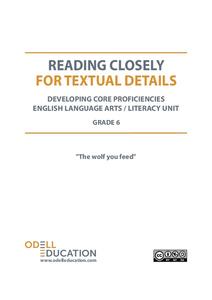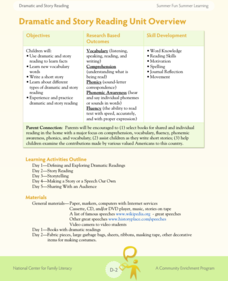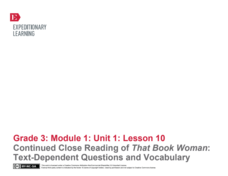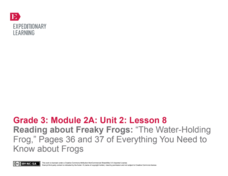EngageNY
Developing Reading Fluency: Criteria for Reading Aloud
Third graders develop their reading superpowers in a lesson plan on fluency. After first listening to an audio recording or teacher read aloud, the class works together identifying criteria for fluent reading, focusing on phrasing, rate,...
EngageNY
Developing Reading Fluency: Selecting a Text and Practicing Reading Aloud
Young readers continue to strengthen their fluency skills with a text of their choosing. The teacher first engages the class with an audio recording or read-aloud of a short poem, modeling for children how to read fluently. Next it's...
Odell Education
Reading Closely for Textual Details: Grade 6
Close reading doesn't mean to literally read text close to your face, but rather to pay attention to particular details in order to develop a deep and purposeful understanding of text. The first part of a five-part resource provides an...
Read Write Think
Poetry Portfolios: Using Poetry to Teach Reading
Over the course of five periods, scholars create a poetry portfolio. They begin with a reading of the poem, Firefly. With a focus on vocabulary, learners reread the poem then look for sight words and other skills.
Core Knowledge Foundation
The Human Body—Systems and Senses Tell It Again!™ Read-Aloud Anthology
Nine lessons over three weeks explore the human body through read-alouds. Third graders listen to and discuss a reading followed by extension activities, including word work and comprehension practice. Learners draft a narrative essay.
Core Knowledge Foundation
The Ancient Greek Civilization Tell It Again!™ Read-Aloud Anthology
A read-aloud anthology explores the ancient greek civilization. Over four weeks, second graders explore Mount Olympus, Sparta, Athens, the olympic games, philosophers, and Alexander the Great. Scholars listen to and discuss a reading,...
Core Knowledge Foundation
The Human Body Tell It Again!™ Read-Aloud Anthology
A read-aloud anthology showcases various stories about the human body. Scholars participate in lessons that introduce a reading, listen to and discuss the reading, then complete in-class and at-home practice.
Core Knowledge Foundation
Different Lands, Similar Stories Tell It Again!™ Read-Aloud Anthology
A read-aloud anthology highlights how one story differs depending on where it comes from. Scholars listen carefully to familiar and new stories, participate in discussions, and complete word work practice. Extensions for each lesson...
ProCon
Is Homework Beneficial?
Does homework improve student achievement, or does it increase stress? Scholars use the included debate topics website to prepare for a class discussion or debate about whether homework is advantageous. After reading a brief background...
EngageNY
Reading Proficiently and Independently: The Power of Setting Goals
Scholars reflect upon their reading strengths and challenges to create personal reading goals. Participants use goal-setting verbiage in an accordion-style graphic organizer, a first step in writing a letter that details their reading...
Curated OER
My Antonia: Directed Reading Thinking Activity
Walk your pupils through the beginning of My Antonia by Willa Cather with a read-aloud-style activity. The goal is to make predictions and back them up with textual evidence.
National Center for Families Learning
The Summer Fun Summer Learning Dramatic and Story Reading Unit
What's the difference between story reading and story telling? Participants in a summer enrichment program learn all about the difference as they listen to famous speeches, engage in dramatic readings, and craft their own short stories...
EngageNY
Reading for Gist: “Middle Ages” Excerpt 1
Dig deep. Scholars dig deep for meaning while reading Middle Ages Excerpt 1. They begin by finding unfamiliar words and adding them to a word catcher. Pupils then take a close look at adversity in the text and complete an...
EngageNY
Close Reading of Thank You, Mr. Falker: Identifying the Superpowers of Reading
Third graders read excepts from the story, Thank You, Mr. Falker in order to gain practice in understanding an unfamiliar story by focusing on the details. They use a worksheet, embedded in the plan, which directs them to certain...
EngageNY
Continued Close Reading of That Book Woman: Text-Dependent Questions and Vocabulary
Explicitly explained and delightfully detailed are two ways to describe this tenth lesson plan in a larger unit designed for the first few weeks of third grade. Learners continue to use and develop previously learned close reading...
EngageNY
Continued Close Reading of Rain School: Text-Dependent Questions and Vocabulary
The engaging story Rain School is further explored in the third lesson of a larger unit that explicitly teaches close reading skills by answering questions whose answers can only be found inside the text. Through teacher...
EngageNY
Reading about Freaky Frogs: “The Amazon Horned Frog"
The Amazon Horned Frog is the focus of a activity designed to encourage readers to ask and answer questions. A frog-themed poem opens the door to a whole-group discussion. Following a read-aloud of an informational text, a three-page...
EngageNY
Reading about Freaky Frogs: “The Water-Holding Frog"
Boost reading comprehension skills with a lesson all about freaky frogs. A poem hooks scholars and takes them into a reading of an informational text followed by peer discussions. A three-page worksheet focuses on text features and...
Benjamin Franklin Tercentenary
What Ben Read
Just what did Ben Franklin read? By juxtaposing Ben Franklin’s reading material as a young man with an analysis of his developed ideas, learners gain the opportunity to see how the influences of his youthful reading played out. Roman,...
Core Knowledge Foundation
Westward Expansion Tell It Again!™ Read-Aloud Anthology
The westward expansion is the focus of a read-aloud anthology. Pupils will listen to and discuss stories about going West, an adventure on the Erie Canal, the Trail of Tears, the Oregon Trail, the Pony Express, and the transcontinental...
EngageNY
Reading Maps: Locating the Countries We Have Been Reading About
Show your class how to read a map and decipher all of the markings and features. Start out by connecting maps to their homework from the night before and their current reading, in this case That Book Woman, and a related informational...
Ed Worksheets
Read the Story
Want to boost your readers' comprehension skills and strategies? Look to these five pages, each with a short story and questions to answer covering main idea, facts, sequence of events, context clues, conclusions, and making...
EngageNY
Grade 10 ELA Module 1: Unit 2, Lesson 8
Now what? Class members continue their close reading of Ethan Canin’s short story “The Palace Thief,” focusing on Hundert's feelings about his retirement, and consider what these feelings reveal about his character.
EngageNY
Grade 9 ELA Module 2, Unit 3, Lesson 10
Did Bernie Madoff fit the profile of a Ponzi schemer because, as Diana Henrique contends in an excerpt from her The Wizard of Lies: Bernie Madoff and the Death, he “did not fit the profile of a Ponzi schemer”? Huh? Groups begin their...
Other popular searches
- Reading Homework Packets
- Reading Homework Log
- Homework Sheet Reading
- Cloze Test About Homework Stew
- Sight Word Reading Homework























